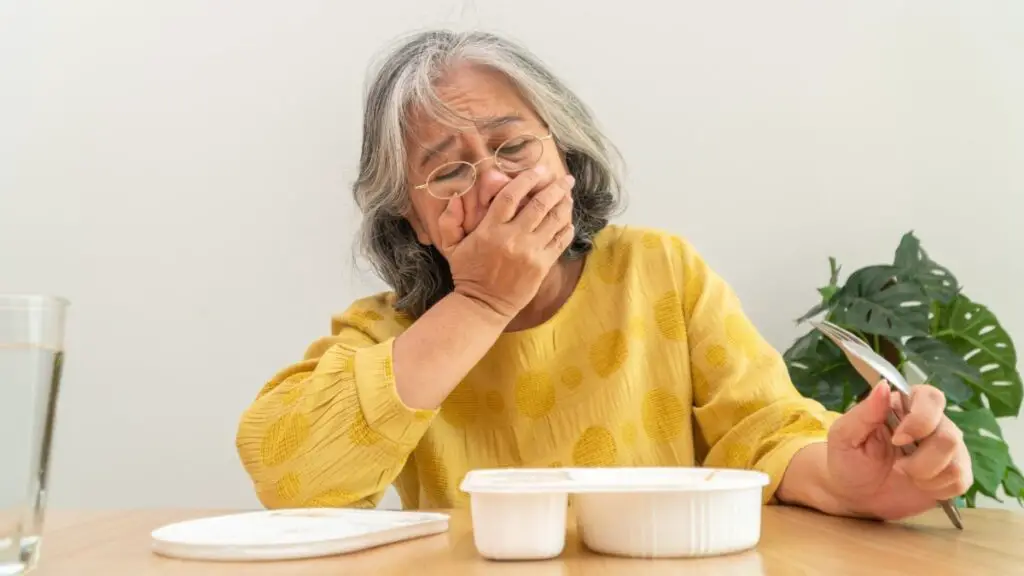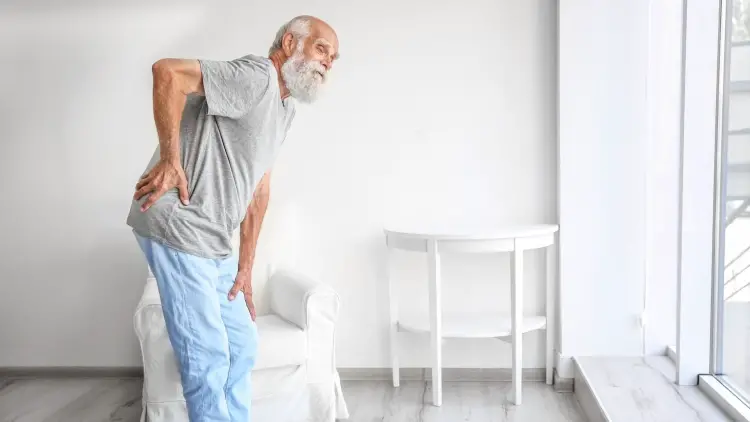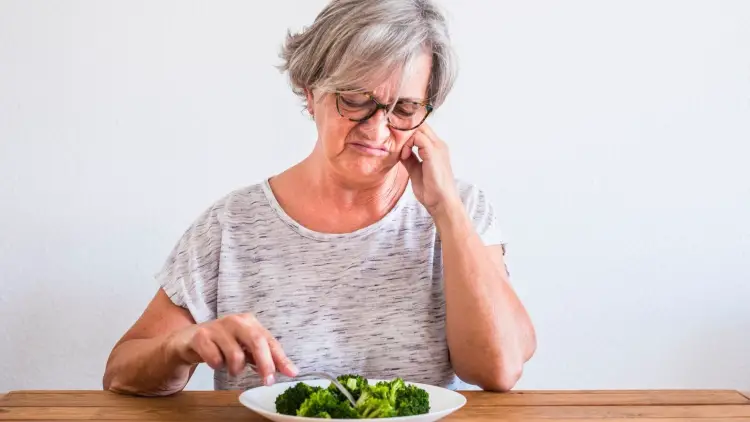Food is fuel, and without it, the bodily engine eventually stops running. When this happens to a car, it’s inconvenient, but when it happens to a person, it’s catastrophic and heartbreaking. Loss of appetite and its cascade of consequences is a serious problem amongst aging populations.
Eating too little has serious health repercussions, especially for seniors. Loss of appetite and reduced nutrient intake are strongly correlated with sarcopenia, malnutrition, depleted energy and compromised immune function. These factors also lead to increased rates of hospitalization and poor health outcomes, including increased mortality.
So, why do seniors lose their appetite? That’s the subject of this article.
What Exactly is Appetite?
Appetite is the desire to fulfill a physiological need. Its regulation is not perfectly understood, but the control system seems to be a network that includes the brain, digestive system, endocrine system and nerves. In response to certain stimuli, such as the lack of food, or the smell of a favorite food, the system may act to encourage eating.
Appetite consists of three components: hunger, satiation and satiety. Hunger promotes the consumption of food. Satiation is the feeling that you have had enough to eat and is the terminating signal to stop eating. Satiety is the feeling of fullness that exists between meals.
Dangers of Loss of appetite
In a world that seems to have conflated skinny with healthy, many people underestimate the health consequences of loss of appetite and the resulting weight loss and nutritional deficiencies, especially in seniors. A large part of the issue is that once health consequences start manifesting as a result of loss of appetite, it’s hard to turn the situation around. Older people struggle to regain lost muscle and health and generally replenish the body’s stock of connective tissue and other systems that might suffer from malnutrition.
The dangers that loss of appetite poses relate to nutritional deficiencies, which increase the risks of:
- Frailty
- Falls
- Pressure sores
- Longer stays in hospital
- Osteomalacia
- Osteoporosis
- Hip fracture
- Muscle weakness
- Mortality
Malnutrition also leads to impairments in:
- Wound healing
- Immune function
- The general quality of life
Factors Causing Loss of Appetite
There are a host of factors that can cause loss of appetite. These can be related to the aging process and changes in the physiology of seniors. Other causes can be psychological, social circumstances, acute and chronic illness or related to medication use.
Physiological
The physiology of seniors is one of the primary causes of appetite loss. Includes:
- Changes to the digestive system. Almost one-third of seniors have reduced saliva production. It’s not a normal part of aging and could be due to medication or dehydration. Other issues could include dental problems, difficulty chewing with dentures or pain from arthritic inflammation in the jaw. Poor oral health is strongly correlated to frailty in the elderly. Gastric evacuation is slower as food remains in the colon longer, increasing the feeling of satiation. Constipation is also one of the most commonly cited reasons for appetite loss, with up to 50% of nursing home residents complaining about chronic constipation.
- Hormonal changes. Changes in hormones that control appetite are prevalent in seniors, such as lower levels of the hormone ghrelin and increases in the hormone leptin. Ghrelin is the hormone that signals to the brain that it’s time to eat and also signals for the release of growth hormone and insulin. Leptin helps regulate appetite by inhibiting appetite. The resulting changes in these hormones both contribute to appetite loss.
- Disease. Almost all acute illnesses impair appetite, especially chronic and acute infections. Chronic diseases impair appetite and include cardiac failure, pulmonary disease, renal failure, chronic liver disease, Parkinson’s disease and cancer. The anorexia associated with acute and chronic diseases results from higher levels of pro-inflammatory cytokines.
- Pain. Impaired appetite can also be due to decreased dexterity and increased pain associated with eating. Painfully swollen hands or elbows make eating unpleasant and painful. Pain can also increase the time it takes to eat, which may cause food to grow cold and unpalatable. Chronic back pain may also make eating unpleasant since sitting increases pressure on the spine. All forms of pain are associated with loss of appetite, and given that around 50% of seniors suffer from chronic pain, it’s clear why pain is a serious concern.
- Vision, taste and smell. Eating and culinary experiences involve stimulation of the senses. Smell, taste and eyesight contribute to the enjoyment of food. Just consider responses to billboards showing images of food. Impaired or deteriorating senses of smell and taste are strongly associated with decreases in appetite. Eyesight stimulates appetite, and loss of sight leads to decreased appetite.
- Lower energy demand. Muscle loss occurs at an average rate of 1% per year in people over 70. Body composition and physical activity are closely correlated with appetite. One often overlooked factor is the loss of fat-free mass, which relates to loss in non-fat tissue. Non-fat tissue includes body systems such as bone and organs. A reduction in organ size has health implications that include reduced appetite.
Psychological and Psychosocial
Environment and mood both affect appetite. The disruptions and changes to the elderly’s social and psychological environment can have far-reaching implications for loss of appetite and dietary choices.
- Depression. Depression is prevalent among seniors, with up to 10% of community-dwelling residents and up to 30% of old-age-home occupants suffering from depression. Depression is also a known appetite suppressor and a driving force of loss of appetite in older populations.
- Dementia. Patients with any form of dementia tend to eat less. All forms of delirium are associated with made lower nutritional intake. The correlation between dementia and older populations adversely affects appetite across the board.
- Social eating. Humans are social eaters. Eating alone affects enjoyment and also increases unhealthy dietary choices. People who eat alone eat less, with the elderly at higher risk since they face more social isolation than younger populations.
- Mobility. Shopping can be tiresome, with seniors often facing difficulty moving around in shops, including driving, parking, standing in checkout lines etc. The stress associated with buying food can suppress appetite in general.
- Portion control. The portion size presented to the elderly can reduce appetite and is prevalent in hospitals where occupants often cite this as a reason for losing their enthusiasm for eating.
- Loss of independence. Many seniors face circumstances where dietary choices, eating times and where they are allowed to eat are beyond their control. Loss of freedom regarding when, where and what they may eat can adversely affect appetite.
Pharmacological
At least 250 commonly prescribed medications for seniors have a loss of appetite as a side effect, ranging from altering the sense of taste and smell to causing dizziness, constipation or dryness of the mouth.
Managing Loss of Appetite in Seniors
Start by identifying the specific cause of why a particular senior loses their appetite. After identifying the reason, you should implement a plan to address the problem and treat any adverse effects. The final phase of treatment will entail interventions to improve appetite.
Managing Physiological Challenges
Patients who suffer dryness of the mouth can be encouraged to take regular sips of water while given soft and moist foods. Avoid hard and dry foods. If the individual is particularly dehydrated, knowing how to hydrate fast can help.
Check that their dentures fit correctly or try to ascertain general dental health. Offer smoothies or mashed foods to patients who experience difficulty chewing. Treat constipation but manage the condition carefully as seniors react adversely to gastrointestinal irritants.
Treat chronic pain and infections immediately. Focus on those ailments that may exacerbate nausea or pain. Avoid medications that may have constipation or loss of appetite as a side effect.
Herbs and spices could make food more palatable for seniors with an impaired sense of taste and smell. Avoid adding additional sugar.
One way of sustaining appetite throughout a meal is to offer a variety of small portions. Try to ensure that food choices increase the nutrition of a meal.
Make the correct spectacles available to patients who have visual impairments. Use contrasting crockery and eat only in well-lit environments. Non-slip plate mats and specialized cutlery with thicker grips can help patients with arthritic conditions regain independence.
Managing Psychological Issues
Manage depression and dementia appropriately. Patients with depression or dementia respond positively to colourful crockery and finger foods. Some physical or open-air activities will also enhance appetite. Light walking or gardening activities can help lift moods.
Pharmacological Management
Regularly review a patient’s medication to find variations that do not suppress appetite. Take patients off taken off medication that they no longer need or is ineffective.
Restoring Appetite
Use the following guidelines to try and increase appetite and food consumption:
- Environment. The environment in which food people eat plays a role in improving appetite. Colorful rooms, good lighting, adequate airflow and improved ambience contribute to better eating. Care facilities have found that better dining rooms increase general calorie intake amongst patients.
- Mealtime companionship. Companionship during mealtime results in more food consumed and could create anticipation for meals.
- Gentle encouragement and reminders. Reminding seniors regularly of the importance of eating could improve their calorie intake.
- Meal preparation and portions. Seniors who have access to ready-made meals and smaller servings eat more regularly than those who have to prepare meals themselves. The types of food available should be in line with individual preferences and preparation capabilities.
- Drugs or stimulants. There is considerable interest in developing drugs or stimulants for increasing appetite, but no medications to increase appetite are currently registered.
- Exercise and activity. Increased exercise will increase the energy demand and should increase food consumption. Outdoor activities enhance moods and also increase appetite.
Always remember that small changes to a senior’s lifestyle can have far-reaching implications for their health. Make sure to start managing loss of appetite as soon as possible to ensure good outcomes.





